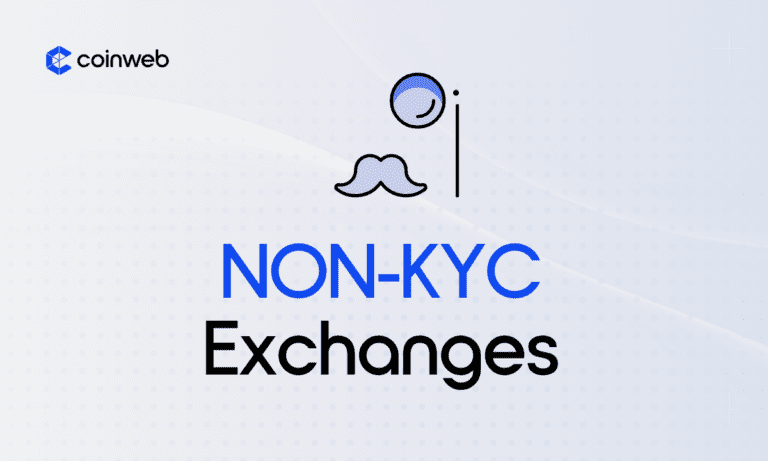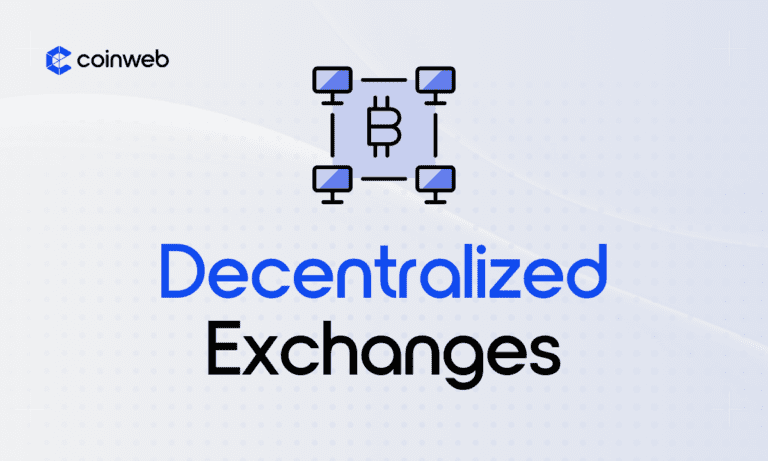TLDR
Non-KYC crypto exchanges allow customers to buy and sell cryptocurrencies without revealing personal information. They come in multiple varieties, such as decentralized exchanges (DEXs), centralized exchanges (CEXs), and hybrid exchanges (HEXs).
When choosing a non-KYC exchange in 2024, it is essential to research the platform’s security measures, reputation in the cryptocurrency industry, transaction fees, the range of coins available for purchase or sale, and customer support services.
We have already done this for you and chosen the best non-KYC crypto exchanges.
Introduction
With the popularity of cryptocurrencies over the past few years, we’ve seen a growing demand for buy-and-sell trading options that don’t require KYC (Know Your Customer) procedures.
Despite stricter regulations and the rising need to protect personal data, you can still purchase digital assets without giving up your identity. Fortunately, anonymous crypto exchanges allow users to buy cryptocurrency with no Know Your Customer (KYC) requirements – making for easy, secure transactions.

Embrace the freedom of the best no-KYC crypto exchanges and make crypto purchases faster and more secure than ever. There’s no need to wade through tiresome KYC verification processes, and these exchange platforms provide a seamless, secure way to buy digital assets with privacy.
When you trade crypto using these major crypto exchanges, you can rest assured that your funds are safe since they have established reliability and trustworthiness. Moreover, most platforms provide 24/7 customer service when difficulties arise during trading.
Overview of non-KYC crypto exchanges
The digital trade cryptocurrency exchange industry is rapidly developing, with innovative platforms allowing users to trade digital assets without needing to Know Your Customer (KYC) regulations. This offers a quick and efficient way of exchanging cryptocurrencies.
This non-KYC cryptocurrency trading exchange allows users to avoid KYC and remain anonymous, trading only with cryptocurrencies. This offers privacy not found with regular exchanges that require identity verification.

Non-KYC exchanges offer numerous trading opportunities, providing users access to some emerging markets with the newest tokens and coins. These exchanges appeal to those who value their privacy and want a convenient way to trade cryptocurrency on their terms.
Cryptocurrencies offer remarkably swift transactions compared to other digital currency operations, making them a top choice for investors seeking quick returns.
How do non-KYC exchanges work?
Non-KYC exchanges work like any other exchange – you deposit, find a trading pair you wish to buy or sell from, select the amount you want to purchase spot trading for (or sell), and then enter your payment details.
The main difference between these no-KYC crypto exchanges and regular ones is that they do not require KYC information or detailed verification; you only need to provide an e-mail address and your wallet address.
This makes no KYC crypto exchanges ideal for those who value privacy and don’t want their information floating on the internet.

No KYC crypto exchanges make trading cryptocurrencies much more accessible and provide various cryptocurrency pairs. This eliminates the need for any complicated and time-consuming regulations or verification processes.
Different types of exchanges to buy crypto without KYC
Centralized exchanges (CEXs)
A Centralized exchange (CEX) is an online platform to trade bitcoin and crypto. Through its centralized design, CEXs strategically connect buyers and sellers in a simple, straightforward manner.
While CEXs are incredibly user-friendly and generally more straightforward to use than their decentralized counterparts, they can also be more restrictive. Since a central authority manages the exchange process, users must adhere to stricter regulations such as Know-Your-Customer (KYC).

Buying cryptocurrency without KYC on centralized exchanges is an enticing option for those wanting to remain anonymous while transacting. With the right resources, you can quickly learn how to acquire crypto without providing personal data.
Pros of centralized exchanges (CEXs)
First up are the pros of using centralized exchanges.
1. Ease of use
Centralized exchanges are far easier to navigate than their decentralized counterparts, thanks to not requiring users to set up a wallet on the exchange. A user needs an account and can trade anonymously and deposit funds directly.
2. Liquidity
By providing a more extensive selection of trading pairs, centralized exchanges create an environment of heightened liquidity that can benefit users. Increased liquidity contributes to more competitive pricing and allows experienced traders to make profitable trades. This kind of centralization creates a win-win situation where buyers and sellers can easily find what they need in one streamlined place.
3. Faster transactions
Another benefit of centralized exchanges is that the transactions are typically completed faster. That is for now but will change as DEXs develop, and the underlying blockchain does, too. Transactions on traditional, centralized exchanges are handled by the exchange itself instead of being tracked onto a blockchain-based system.
Cons of centralized exchanges (CEXs)
Let’s review the downsides of centralized exchanges.
1. Security concerns
The popularity of centralized exchanges has made them increasingly vulnerable to security threats. The high liquidity and the low trading fees and volume make centralized exchanges a lucrative target for hackers.
Many CEXs store user funds in hot, Internet-connected wallets with direct connections to the exchange. So, investors must exercise caution when utilizing these services and know the potential security risks of using the crypto wallet on a centralized exchange.

2. Counterparty risk
Another concern with centralized exchanges is counter-party risk. This is the risk that the other party in a transaction will not fulfill their obligations. For example, if you are selling cryptocurrency on a centralized exchange and the exchange suddenly goes out of business, you may not receive the payment you are owed. This was the risk users had during the FTX collapse.
3. Lack of transparency
Centralized exchanges are often characterized by a need for more transparency, making it difficult to determine how your money is being handled and where it’s stowed away. There are similarities to banks. However, Some exchanges showcase their holding through proof of funds.
4. Dependence on a single entity
Centralized exchanges rely solely on a single entity. This may lead to a potential loss of funds should the exchange go out of business or become inoperable.
Decentralized exchanges (DEXs)
Decentralized exchanges (DEXs) are digital platforms for exchanging cryptocurrencies, operating completely decentralized, relying on blockchain technology and smart contracts.
DEXs also provide futures trading and margin trading and protect users from the risk of their funds being hacked, as users’ crypto assets remain in their crypto wallets. They enable crypto transactions amongst individual users directly with each other, eliminating the need for brokers and intermediaries.

Decentralized exchanges make this possible if you seek to purchase cryptocurrency anonymously. Some of these exchanges offer tools that make it easy to do your crypto taxes by helping you report transactions in your tax returns. In addition, certain decentralized exchanges do not require verification or Know Your Customer (KYC) checks – meaning you can gain access without revealing your personal information.
Pros of Decentralised Exchanges (DEXs)
1. Increased Security
Decentralized exchanges offer unparalleled security compared to centralized exchanges, as they do not keep user funds in a central wallet. This means those utilizing decentralized exchanges are safe from malicious hacking attempts and cyber risks.
2. Greater Privacy
Decentralized exchanges provide far greater privacy compared to their centralized counterparts. Unlike when you use a centralized exchange, where you have to hand over personal information like your name, address, and date of birth – decentralized exchanges require no such data from users. With the former, identity theft is almost guaranteed; with the latter, however, it’s virtually impossible.
3. More Control Over Your Funds
Decentralized exchanges allow you to gain unparalleled control of your funds, as only you can access your private keys. Unlike centralized exchanges, this enables improved autonomy over the safety and security of your money.
4. Access to a Wider Range of Assets
Decentralized exchanges typically offer access to more assets than most centralized exchanges do. No listing fees are associated with listing assets on decentralized exchanges. As a result, many small-cap and altcoins are only available on decentralized exchanges.
5. Lower Fees
Decentralized exchanges are attractive for those attempting to maximize their profits since they impose lower fees than other platforms. This is due to the absence of middlemen in ordering and trading, leading to more significant returns at a faster rate.
Cons of Decentralised Exchanges (DEXs)
1. Complexity
Trading on decentralized exchanges can be complex, demanding users possess the technical experience and proficiency necessary to carry out trades successfully.
2. Lack of Fiat Payments
Decentralized exchanges have a significant limitation: they usually do not facilitate fiat currency payments. Fiat currencies refer to government-issued monies without the backing of a precious metal such as gold or silver.
3. Low Liquidity
A decentralized exchange usually suffers from low liquidity; there aren’t enough buyers and sellers to satisfy demand. This can make it difficult to find someone willing to buy or sell the assets you are interested in and can also lead to wide spreads (the difference between the bid and ask price).
Hybrid Exchanges (HEXs)
The recent emergence of Hybrid Exchanges (HEXs) in the expanding cryptocurrency world has been revolutionary. HEXs grant users a one-of-a-kind combination: both the convenience and liquidity that derive from centralized exchanges (CEXs), along with all the privacy, end-to-end encryption, and speed benefits associated with decentralized trading.
Therefore, you experience unparalleled security within one platform while using advanced capabilities like never before.

Trading with either private individuals or professionals is an option for users, leaving them in complete control of their funds. These exchanges also maximize trade speed and efficiency using advanced matching algorithms to complement user convenience.
HEXs are rapidly becoming the go-to option for cryptocurrency traders, crypto investors, and enthusiasts globally due to their unique ability to unify CEXs and DEX systems.
Pros of Hybrid exchanges (HEXs)
Support both fiat and digital currencies
With the integration of both fiat and digital currencies, HEXs make it easy to capitalize on worldwide markets no matter what financial investment you prefer. This allows users greater freedom when choosing how to invest and benefit from potential price variations in traditional and crypto investments.
Secure
HEXs have become the ideal option for individuals prioritizing security, allowing them to benefit from a level of protection unmatched by centralized counterparts. This additional safeguard is an essential financial defense mechanism, keeping your assets safe and sound from malicious actors.
Affordable
HEXs, also known as Hybrid Exchanges, have become a popular and cost-effective choice in cryptocurrency. Combining features from centralized exchanges (CEX) and decentralized applications (Dapps), these versatile platforms provide unparalleled security protocols at much-reduced costs. This is because of their peer-to-peer referrals, which allow businesses and corporations to keep costs minimal.
Greater control
HEXs empower users to remain in charge of their funds, which is often impossible when using a centralized exchange. A user’s digital currency holdings are never under the supervision of a third party, and they can safely manage their funds with assurance.
Cons of Hybrid Exchanges (HEXs)
Relatively New
Although HEXs appear to be an attractive platform for cryptocurrency, only time will tell whether they can live up to the hype. Without reliable data, many investors take a more conservative approach when investing crypto coins in hybrid exchanges due to their high risk.
Lack of Regulation
Hybrid exchanges typically lack regulation, making it difficult for new investors to feel secure when trading cryptocurrency. This loosely regulated atmosphere by financial institutions opens the door to scams and “pump and dump” schemes and fails to address other problems, such as anti-money laundering protocols or security measures.
Factors to consider when choosing a non-KYC exchange
1. Security
Selecting a non-KYC crypto exchange entails assessing its security measures since it is not beholden to the same regulations as other cryptocurrency exchanges. These regulatory requirements are necessary to be more vulnerable than conventional platforms. Reliable safety protocols are paramount for investing confidently and securely with no-KYC crypto exchanges.

Additionally, these exchanges are less secure than traditional ones and more prone to hacks due to a lack of stringent security protocols.
2. Privacy
When searching for a non-KYC exchange, always consider the degree of privacy it provides you. Fortunately, these best crypto exchanges aren’t mandated to request customers’ personal information so confidential trades can remain intact. Because of this, transactions are much more secure than on other platforms.

Confirming with the exchange beforehand regarding personal details and their information collection policy is essential since some non-KYC exchanges may still require specific personal data.
3. Fees
Aside from security, another critical element to remember when picking a non-KYC exchange is the fees. These exchanges usually charge lower rates than conventional exchanges since they don’t have to meet the same regulatory demands.
Nevertheless, reviewing the transaction limits, daily withdrawal limits, or trading fees charged by various exchanges before selecting one is crucial since some non-KYC exchanges may still impose high charges.
4. Liquidity
When deciding on a non-KYC exchange, you should consider its liquidity. Liquidity is when an asset can be bought and sold quickly and fairly. Exchanges without Know-Your-Customer (KYC) processes often possess lower liquidity than traditional exchanges since fewer people use them and have less recognition.
5. Support
When trusting a non-KYC exchange to handle your monetary transactions, you must trust and be confident that the customer service is secure and dependable.

For other exchanges that don’t require customer information, customer service is generally not as good as traditional crypto trading platforms since they aren’t obligated to offer assistance or regulate withdrawal limits.
This can be a hassle if you experience difficulty with your unverified accounts or authenticated accounts or need support when copy trading cryptocurrencies, leaving users feeling helpless in finding answers.
Conclusion
Many options are now available if you want to purchase crypto without KYC. The types of exchanges mentioned in this article offer exceptional features and advantages that make them worthy contenders for the best crypto exchange. When selecting the best non-KYC exchange for your requirements, consider every aspect discussed here to make an informed decision.
As cryptocurrencies continue to surge in popularity and non-KYC exchanges become more sought after, regulations are likely on the horizon for the crypto industry. These regulations will ensure investor safety and a dependable platform for digital asset exchange transactions while avoiding money laundering. This could benefit the crypto market, legitimizing digital assets and inspiring more trust in them as an investment opportunity.
HEXs grant users a one-of-a-kind combination: both the convenience and liquidity that derive from centralized exchanges (CEXs), along with all the privacy, end-to-end encryption, and speed benefits associated with decentralized trading.
Yes, depending on the platform. Some exchanges allow cryptocurrency transactions without personal identification requirements.
Non-KYC exchanges enable users to conduct financial transactions without identity verification. Users can register without KYC but may face reduced withdrawal limits and some functional limitations.





















